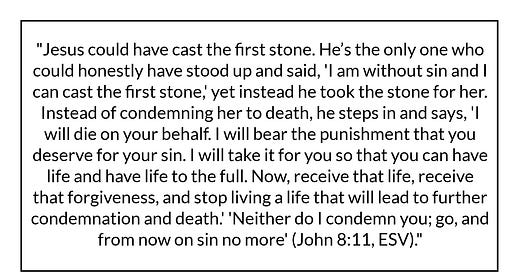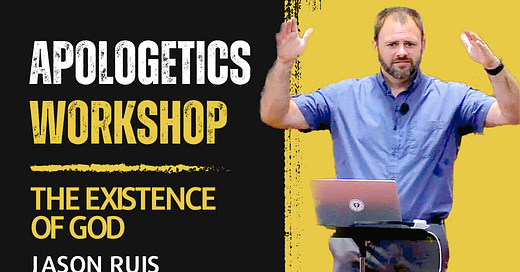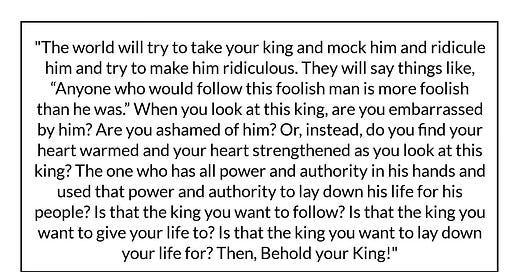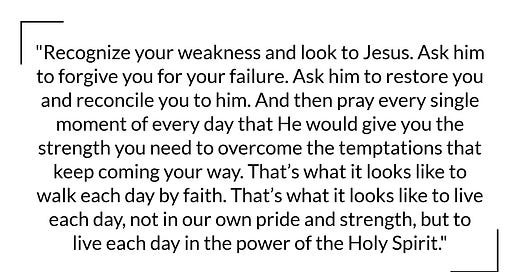
The Adulterous Woman
[Read John 7:53-8:11]
Several years ago, someone cynically pointed something out to me that has stuck with me and has proven true numerous times—not always true, but many times it has proven true. They said, “Often when someone is accusing you of something, they are guilty of the very thing they are accusing you of.” Take the example of playing a game with a child who continually accuses you of cheating, while they are continually trying to cheat. Or the person who is always accusing people of stealing their stuff, while they are stealing people’s stuff. Or the person who always accuses people of sneaking around and manipulating things, while they are sneaking around and manipulating things. I’ve watched this over and over and over again.
I’ve also wondered why this happens. I don’t know if I have all of the answers to it, but I have one thought that seems to make sense. We all assume that people are like us—doing and acting like us—but we also assume that we are righteous in our actions. So, while we are going around sinning and doing wicked things, we ASSUME that we have good and righteous motives in doing those things BUT we also assume that those other people who are doing the same things have UNRIGHTEOUS motives. That’s why we’re angry about it. That’s why we’re frustrated and bothered by it. That’s why we’re accusing them while excusing ourselves.
The reality is, it’s all hypocrisy. The essence of hypocrisy is for there to be a disconnect between what you believe, say, and do. So, when you’re saying that you can do a particular sin and it’s righteous but other people cannot righteously do that sin, it’s hypocrisy. Or when you are constantly trying to excuse your sin, pretending like you have good reasons for that sin, while you go around accusing everyone else for their sin, pretending like there is no good reason for their sin, you are being a hypocrite. There’s a disconnect between what you’re believing, saying, and doing. It’s hypocrisy, and it lives in each one of our hearts—every single one of us—and we need to acknowledge it.
That’s what’s going on in this passage. As we dive into this passage, I want to make sure I set the stage a little bit and remind us what’s been happening in the story recently. Remember, Jesus has been teaching in the temple during the Feast of Booths and he’s been causing a bit of a ruckus. Some people believe in him, but many people are confused, frustrated, and very angry with Jesus. Various groups are organizing to have Jesus arrested to keep him quiet and get him out of the temple. Yet, when this story starts, we read, “They went each to his own house, but Jesus went to the Mount of Olives. Early in the morning he came again to the temple. All the people came to him, and he sat down and taught them.” (John 7:53–8:2, ESV). So, after the big ruckus Jesus created in the temple on the big day of the Feast of Booths, he headed off on his own to the Mount of Olives for the evening, but what does he do first thing the next morning—early in the morning? He heads right back to the temple—right back to the conflict and anger and frustration—and begins teaching again. It seems like it’s a pretty big crowd that gathers around him because it says that “All the people came to him…” It’s the pattern that we’re going to see over and over again in the Gospel of John (and the other gospels): Jesus is continually teaching, the people are continually gathering around him, and the religious leaders are continually trying to arrest him or trap him so they can arrest him. Yet, none of that deters Jesus from accomplishing his mission. He has an unswerving commitment to fulfill the Father’s mission in his life AND he has an unswerving faith that nothing will happen to him until his hour has come—until the Father carries out his plan. So, he keeps doing what the Father has called him to do and keeps entering into extremely difficult situations. saf
Obviously, this angers the Pharisees and they come up with a plan. They see Jesus back in the temple and they see a large crowd of people surrounding Jesus and they see an opportunity. They think to themselves, “Here we go. Now is the time to put Jesus on the spot and make him look bad in front of a large group of people. Then everyone will see him for the fraud/false teacher that he is and we will be able to get rid of this guy.” That’s why we read, “The scribes and the Pharisees brought a woman who had been caught in adultery, and placing her in the midst they said to him, “Teacher, this woman has been caught in the act of adultery. Now in the Law, Moses commanded us to stone such women. So what do you say?” This they said to test him, that they might have some charge to bring against him.” (John 8:3–6, ESV). Notice that last line because that’s extremely important. They did all of this to test him—or trap him—so they could finally arrest him. None of this had anything to do with the law. None of this had anything to do with the woman either. It was all about the “battle” between the Pharisees and Jesus. They were going to do whatever they can do—whatever it takes—to get Jesus arrested. This is important because it helps us get a better understanding of why Jesus responds the way he does and a better understanding of what Jesus says. It’s all a response to the fact that they are trying to trap him.
Yet, it’s also important to recognize that what they’re saying isn’t completely wrong. We read this in Deuteronomy, “If a man is found lying with the wife of another man, both of them shall die, the man who lay with the woman, and the woman. So you shall purge the evil from Israel.” (Deuteronomy 22:22, ESV). This was the judgment on those that committed adultery. God said that they were to die for it. Of course, there’s been a lot of talk over the years wondering where the guy is in this story because you can’t commit this type of adultery by yourself. To some degree, that’s not the point of this passage—although it is another arrow pointing at the absolute hypocrisy of these religious leaders. Yet, again, what they are saying isn’t necessarily wrong. The punishment for committing adultery was death, and that included the woman standing before Jesus and the crowds.
What I appreciate in this story is the way Jesus responds to the Pharisees. We read, “This they said to test him, that they might have some charge to bring against him. Jesus bent down and wrote with his finger on the ground. And as they continued to ask him…” (John 8:6–7, ESV). Make sure you keep the picture of this story in your mind. Jesus has been teaching in front of a large group of people, the Pharisees interrupt his teaching, bring this woman to Jesus in front of everyone, and DEMAND that Jesus makes a decision/ruling right now. And what does Jesus do? He ignores them. He stoops down and doodles in the dirt. As he doodles in the dirt, the Pharisees keep asking him to make a decision and Jesus keeps ignoring them. He just keeps on doodling.
Now, there’s been a lot of speculation about what Jesus wrote in the dirt, but it’s not important for us to try to figure that out. If John thought it was important, he would have told us what Jesus wrote. That tells us that WHAT Jesus wrote wasn’t the important part, but THAT Jesus was writing was important. I think Jesus is writing in the dirt to show the Pharisees that he would not do things according to their demands and their requirements and their timeline. I think this is Jesus showing the Pharisees that he isn’t going to treat them like they are a big deal. Jesus isn’t going to treat them like authority figures. He wasn’t going to give them the time of day. So, they could keep on asking him and demanding him to act, but he wasn’t going to do anything according to their demands, only what the Father tells him to do.
Which is why he eventually speaks. He gets up from the ground, looks at them, and says, “Let him who is without sin among you be the first to throw a stone at her.” (John 8:7, ESV) and then stoops back down and doodles in the dirt some more. Then we read, “But when they heard it, they went away one by one, beginning with the older ones, and Jesus was left alone with the woman standing before him.” (John 8:9, ESV). Now, this is talking about the Pharisees. They are the ones who walk away after Jesus’ comment. What’s going on here?
As we dive into this part of the story, it’s important to recognize what’s actually going on here. This is a very powerful story that many people know and appreciate, but that also means that many people misunderstand it and misrepresent what’s happening in this story. I’ve heard many people tell this part of the story in a way that makes it seem like Jesus was downplaying the Law of God, kinda like he was saying, “We’ll I know what the law says we should do, but you shouldn’t do that. You should be nicer and gentler than that.” I’ve heard other people tell this story—and make applications from this story—that would prevent anyone from ever confronting someone about sin in their life. They basically say, “Well, are you without sin? Who are you to talk to someone about the sin in their life when you are a sinner yourself?” Neither of these applications can be true.
First, Jesus never lowers the importance of God’s Law. NEVER. Every time Jesus talks about the Law of God, he is raising the bar, telling people they aren’t taking the Law seriously enough. That means we cannot assume that Jesus is trying to lower the bar in this instance. Second, Jesus isn’t telling people that they can never confront people about their sins, since everyone is a sinner. We know Jesus isn’t saying that because Jesus explicitly tells us to confront people with their sins. So, that’s not what Jesus means here either. So, what is going on?
At the core of what Jesus is doing here, is pointing out the hypocrisy of the Pharisees. Once again, he’s telling them that they don’t love the law as much as they say they do and he accomplishes that in a few ways. First, he is pointing to another portion of the Law that reads, “On the evidence of two witnesses or of three witnesses the one who is to die shall be put to death; a person shall not be put to death on the evidence of one witness. The hand of the witnesses shall be first against him to put him to death, and afterward the hand of all the people. So you shall purge the evil from your midst.” (Deuteronomy 17:6–7, ESV). The law had stipulations for putting someone to death. It couldn’t happen on the basis of one witness. There had to be two or three witnesses to the act. Then, if there were two or three witnesses to the act, one of those witnesses had to be the one to cast the first stone. Nothing could happen unless one of the witnesses cast the first stone. So, in a way, Jesus is saying, “The Law also demands that there be witnesses. Where are they? The Law also demands that the witnesses be the ones to cast the first stone. Where are they?” Once again, Jesus is pointing out that they don’t love the law as much as they say/think they do.
Yet, he’s saying even more. I love this insight from DA Carson on this passage. He writes, “This is a direct reference to Deuteronomy 13:9; 17:7 (cf. Lv. 24:14)—the witnesses of the crime must be the first to throw the stones, and they must not be participants in the crime itself. Jesus’ saying does not mean that the authorities must be paragons of sinless perfection before the death sentence can properly be meted out, nor does it mean that one must be free even from lust before one can legitimately condemn adultery (even though lust and adultery belong to the same genus, Mt. 5:28). It means, rather, that they must not be guilty of this particular sin.” (DA Carson, 336). That’s a powerful statement. When Jesus talks about the one “without sin” he is talking about the one who is without THIS sin. Jesus is telling the group of religious officials, “Fine, the Law not only demands that the witnesses be the first to cast a stone, but the Law also demands that the person casting the first stone not be guilty of the crime. So, if any of you are not guilty of committing adultery, go ahead and throw the first stone.” And they all walk away. Once again showing that they didn’t love the law as much as they said they loved the law. As I mentioned at the beginning of this sermon. They are hypocrites. They are accusing this woman of something they are guilty of themselves.
I should also say, if you want to understand this passage more broadly and don’t believe it’s talking about the particular sin of adultery, but talking about sin in general, the point is still the same. Jesus is still looking at a group of religious leaders, who live and act like they are the holiest of holies, and saying, “You are all sinners. Every one of you. And that should show you that you don’t love the law as much as you think/say you do.” It’s still the same point. They’re hypocrites and Jesus is calling them out for it.
All of the Pharisees walk away but we’re told the woman stays there—which is pretty interesting if you think about it. Don’t you think she would have taken her opportunity to get out of Dodge? To make a run for it while everyone is walking away and while Jesus is doodling in the dirt. But she doesn’t. She stays there, standing in front of Jesus. Then we read, “Jesus stood up and said to her, “Woman, where are they? Has no one condemned you?” She said, “No one, Lord.” And Jesus said, “Neither do I condemn you; go, and from now on sin no more.”” (John 8:10–11, ESV). This beautiful mix of tenderness and firmness. On the one hand, we see Jesus telling this woman she is not condemned and in the same breath we hear Jesus telling her to stop sinning. This is what John meant when he said at the beginning of this Gospel: “And the Word became flesh and dwelt among us, and we have seen his glory, glory as of the only Son from the Father, full of grace and truth.” (John 1:14, ESV). This is full of grace and truth. Jesus reminds this woman that he’s not there to condemn her, but also tells her to stop sinning so that she would not be condemned. John Calvin says, “By the same word of God when forgiveness is offered to us, we are likewise called to repentance” (324).
There’s so much for us to learn in all of this. At times it feels impossible to find the beautiful balance of Jesus—full of grace and truth, offering forgiveness while calling to repentance. We so easily fall into unfaithfulness on either side. Don’t make the mistake of thinking that the Pharisees are only on one side of the ditch. So many people want to pit the Pharisees as the legalistic, hard, mean people, against the non-legalistic soft, nice people, trying to strike a balance in the middle. Yet, the Pharisees are not actually legalistic. That’s been Jesus’ point. The Pharisees want everyone to think they are legalistic—and to think they love the law—but they actually don’t. They are the ones who actually don’t take sin seriously. They are on both sides of the ditch here. They neither have grace, nor truth.
This is why Jesus will repeatedly confront the Pharisees with their blindness—and, in turn, confront us with our own blindness. This is why Jesus will eventually tell them, “Why do you see the speck that is in your brother’s eye, but do not notice the log that is in your own eye? Or how can you say to your brother, ‘Let me take the speck out of your eye,’ when there is the log in your own eye? You hypocrite, first take the log out of your own eye, and then you will see clearly to take the speck out of your brother’s eye.” (Matthew 7:3–5, ESV). Take the log out of your own eye before you try to look at the speck in someone else’s eye. Or in this particular passage, deal with your own adultery and sinfulness first, then you may be able to help this woman with her sin and adultery. Stop being a hypocrite. They are not being called hypocrites for addressing the sin of other people. They are being hypocrites for not addressing their own sin first—pretending like they are not also sinners. That’s what is hypocritical.
That will change everything. When we take the time to come face to face with our own sin—when we recognize the log in our own eyes and the adultery in our own hearts—it will change the way we address the sin in other people. We won’t come to them as holier-than-thou people wanting to smack them around. Instead, we will come to them as fellow sinners—not to condemn them or punish them—but to lead them away from the death and destruction that comes from sin. We can say, “Yeah, I’ve been there too and I’ve seen how that has destroyed me and the people around me. I’m not here to condemn you. I’m here to tell you to turn from your sin, receive forgiveness, and find true life in Jesus Christ.” That’s much closer to being full of grace and truth.
What’s powerful about this passage is that Jesus could have cast the first stone. He’s the only one who could honestly have stood up and said, “I am without sin and I can cast the first stone,” yet instead he took the stone for her. Instead of condemning her to death, he steps in and says, “I will die on your behalf. I will bear the punishment that you deserve for your sin. I will take it for you so that you can have life and have life to the full. Now, receive that life, receive that forgiveness, and stop living a life that will lead to further condemnation and death.” “Neither do I condemn you; go, and from now on sin no more.” (John 8:11, ESV).









